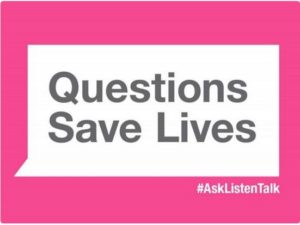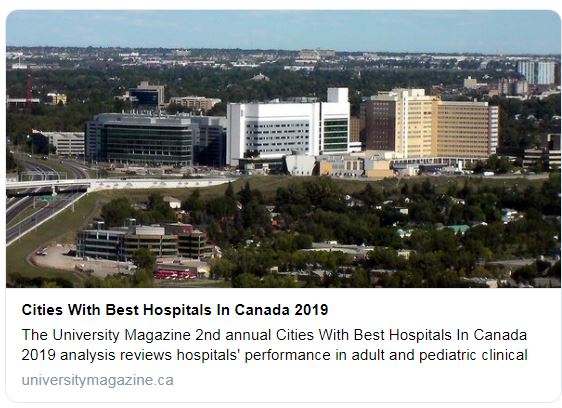If you only have time to read only one article today and/or watch one video, you may wish to make it this one. Thanks, Peter, for bringing this topic to our attention. As you correctly noted, it is “profoundly eye-opening, unsettling, yet so important.” This “elephant” is definitely worth talking about.
Category Archives: Physician
Make the List
Which cities in Canada have the best hospitals? This was a question explored in a recent edition of “University Magazine.” Click here to find out if your city made the list and what constitutes the “best hospitals.”
Cast Your Vote
What’s Important to Seniors’ Health in Alberta?
Do you live or work in the province of Alberta and are you:
- an older adult (65 years of age and over),
- a caregiver of an older adult (spouse; family member; friend; neighbour), or
- a clinician or health/social care provider (doctor; nurse; care aides; allied health provider; pharmacist; social worker) working with older adults?
If so, the Scientific Office of Alberta’s Seniors Health Strategic Clinical Network invites you to complete the following survey. By responding to the survey, you will be helping to determine the direction/priorities for future research and initiatives in the area of seniors’ health.
Out in the Streets

Dr. Jeff Turnbull gets a hug from Shelley, a client, after she gave him a Christmas card, at the Temporary Enhanced Shelter Program at the Shepherds of Good Hope in Ottawa’s Lowertown neighbourhood, Thursday, Dec. 14, 2017. (Photograph by Justin Tang)
Have you heard of Dr. Jeffrey Turnbull? If not, reading the following will give you a sense of who he is and the important work he is doing.
“At 9:30 a.m. on a bitingly cold early-winter morning, Jeffrey Turnbull is preparing to head out on rounds. From a second-floor window in the ramshackle offices of Ottawa Inner City Health, the Peace Tower is visible in the distance, but Turnbull gestures out over the nearer, nondescript rooftops of Lowertown, describing the long-established homeless shelters there—and the new supervised injection clinic—that he’s about to visit.
A few minutes later, he’s parking his SUV outside the Shepherds of Good Hope, a shelter and soup kitchen, leading a small team that includes a mental health nurse into what they just call “the trailer.” It’s a former construction trailer set up recently behind “the Sheps,” fitted out as a cramped but orderly space where drug addicts can inject themselves with health care workers standing by.
Even on this weekday morning, it’s busy. About 130 addicts used the trailer the previous day. Turnbull has a brief meeting with staff there, then strides next door to a clinic for homeless women…” Click here to read the full article from the Macleans.ca.
Are You Dancing With Your Healthcare Provider?
In this video, Sarah Krüg uses the analogy of the continuous give and take in the “Tango” to illustrate the foundation of balanced partnership and connection that can exist between patient and physician. Unfortunately, this dance may not be occurring for some patients. As one member of the Patients 4 Change community stated, “To date, there are multiple songs playing at the same time, with each one having a different beat. Suffice it to say, my feet are very sore from being stepped on.” What kind of dance do you share with your healthcare providers?
Today is the last day to have your say.
 The College of Family Physicians of Canada (CFPC) and its key partners, Choosing Wisely Canada and the Canadian Cancer Action Network, are dedicated to supporting family doctors in providing the best possible care to their patients and communities. Their goal is to help patients feel comfortable asking questions and having conversations with their family doctor, making the clinical office environment a ‘safe zone’.
The College of Family Physicians of Canada (CFPC) and its key partners, Choosing Wisely Canada and the Canadian Cancer Action Network, are dedicated to supporting family doctors in providing the best possible care to their patients and communities. Their goal is to help patients feel comfortable asking questions and having conversations with their family doctor, making the clinical office environment a ‘safe zone’.
Related to this, are questions such as:
1. What does a ‘safe zone’ mean to you?
2. What is important to you in your interactions with your family doctor?
To assist in the creation of a “safe zone” for all, you are invited to participate in the College of Family Physicians of Canada survey.
Please note that the survey closes on Monday, August 21st, 2017.
The Sign Says What?!
For many people, going to the doctor’s office can be a stressful, anxiety generating, uncomfortable experience. One can only imagine what an indigenous individual would feel upon entering his/her doctor’s office and being greeted by sign that said the following:
“Attention: native patients please don’t ask for tranquilizers or pain medications.”
Maxine Ginnish, who works at the Rising Sun Healing Centre, and took a photograph of the note posted at her doctor’s office is seeking an apology. Click here to read the full story.
Patient First?

“Patient first” is a term that is often used in the health-care sector. However, are we first and foremost patients? Is that how we see ourselves?
According to Dr. Jordan Asher, he sees his patients differently. To him, he sees them as people first. “[I]n order for you to have a better health status, which includes healthcare, I need to think about you as a human being…We don’t look at people as diabetics; we look at them as people that have a bunch of life issues that happen to have diabetes.” How does this philosophy influence the manner in which Dr. Asher works with his patients? Click here to find out.
Ask a Question
Did you know that more than 100,000 Canadians are unintentionally harmed during hospital stays in 2014-2015? Unfortunately, some of these incidents result in permanent damage or even death. To help increase patient safety, the Canadian Patient Safety Institute has initiated a campaign called the “Questions Save Lives Campaign.” What question would you ask your doctor to make your health care safer?

Click here to find out more about the campaign and how you can get involved.



